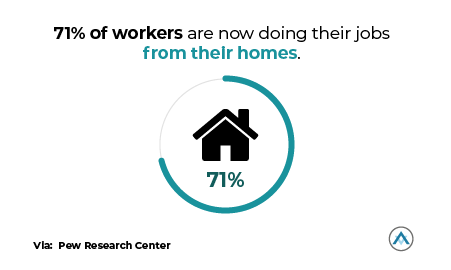Q: How do I find my niche when launching my small business?
A: Finding the right niche for your business is the key to succeeding in the crowded market of today.
The modern market is extremely e-commerce focused. With the enormous disruption caused by the pandemic, Americans are using the internet for everything.
This market shift has left many small business owners asking “how can I find my niche?”
While it’s always been an important part of business, there are reasons it’s become more prevalent than ever.
According to Pew Research Center, 71% of workers are now doing their jobs from their homes.
This shift in work has both a correlative and causative effect on the way people shop. The pandemic has made people reluctant to shop in person the way they once did.
Additionally, working from home means people are out and about less, making them less inclined to pop by the store on the way to work.
All of this comes at a time when people are starting up small businesses more than ever before, creating a dizzying array of choices for every kind of product or service you can think of.
The competition is fierce, but the market is incredibly diverse. Consumers can be targeted with such specificity that they have become choosier, meaning they are just waiting for the perfect product.
“The two major benefits of occupying a niche: you don’t have to compete for the same resources and you’re able to tailor your approach to maximize use of the resources you do pursue.”
You can be that perfect product. You just have to find your business’ niche and capitalize on it.
Here’s how to do it.
- What is a business niche?
- Do I need a niche for my business?
- What are some secrets for finding a niche for a business?
What is a Niche?
Before we dig into how to find your business niche – or niches, we need to get a thorough understanding of what a niche is.
A niche, in some ways, is a specific role or function that is occupied by a specialized tool, solution, or agent.
Oxford Languages defines niche as:
. . .
noun
- a comfortable or suitable position in life or employment.
“he is now a partner at a leading law firm and feels he has found his niche” - a specialized segment of the market for a particular kind of product or service.
“he believes he has found a niche in the market.”
adjective
- denoting products, services, or interests that appeal to a small, specialized section of the population.
“other companies in this space had to adapt to being niche players”
verb
- place (something) in a niche or recess.
“these elements were niched within the shadowy reaches”
. . .
Take ecology as an example.
In an ecosystem, each organism is said to occupy a certain niche. For instance, a heron is specifically adapted to catching and eating fish.
Because of this specialized focus on a certain food source, the heron thrives. It avoids competition with land predators and has been able to evolve tools that make catching fish easier.
Here we can see the two major benefits of occupying a niche: you don’t have to compete for the same resources, and you’re able to tailor your approach to maximize the use of the resources you do pursue.
What is a Business Niche?
When we turn our attention to the business world, a niche is actually pretty similar to the above example. The main difference is that you’re trying to serve a targeted population rather than consume them.
A business niche is the unique segment of the broader market that you hope to target with your marketing and hopefully turn into customers.
This makes things simpler for you. You have a clear direction for product development and marketing efforts and can start to build your brand voice with clarity.
Having that clarity can make you more efficient and help you manage your time more effectively.
Finding your niche can also help you make more money. As Forbes points out, honing in on a niche typically allows you to charge more or make more sales than trying to market to the general population.
Do I Need a Niche for My Business?
It’s natural to be a bit skeptical about finding a niche for your business. After all, marketing to everyone casts a broader net.
The issue is, we live in a hyper-competitive marketplace. With enormous companies like Amazon offering conveniences that can only be achieved through massive-scale operations, small businesses are likely to get lost in the fray.
While that may be discouraging, there is hope.
CNBC points to the tremendous rise in niche businesses that sprang up during lockdown alongside an 11% increase in the proliferation of e-commerce within an eight-week span.
This speaks to the necessity of finding a niche for your small business. Niches allow you to connect with consumers by speaking to their needs on a personal level that broader marketing simply can’t achieve.
When you attempt to market broadly, you compete with everyone. When you get specific, you make yourself the perfect fit for your consumers.
They may be a smaller population, but they are far more likely to read your blog posts, respond to your marketing, and purchase from you. In the end, that’s what matters most.
How Do I Find My Niche?
If you’re sold on the idea of niching for small business growth, here are 5 steps for finding your niche.
1. Determine Your Expertise
The first thing you need to do is figure out your expertise. What are you good at? What area do you know a lot about?
Determining what you are specialized in will allow you to leverage your strengths in your small business. This is vital to making your business stand out against the competition.
Not only that, but it will also help you develop your business faster, as you will already have a good deal of background information on the industry.
2. Identify a Problem You Can Solve
Once you’ve established your expertise, consider the problem you wish to solve. Zoom in on the typical issues your background has trained you to address and select the one you’d like to focus on.
As an example, someone with a background in fitness can take their knowledge and specialize in helping people lose weight, increase endurance, or build strength.
At this step, this theoretical person would select one of these to focus on exclusively.
This allows your business to channel all its energy into solving your chosen issue, making you a better fit than companies with a broader scope.
3. Research Existing Products and Services
With so many businesses and products on the market, it’s highly unlikely that your business will be the only one targeting your niche. That’s why it’s important to do your research.
Explore the current offerings on the market that have been created to address the problem you’d like to focus on. Most likely, there will be several, each with a unique spin on the solution.
Note the variety of offerings, the specific features of both the products and the marketing, and which seem to be the most successful. This will prepare you to develop something unique yourself.
4. Identify the Unserved Market
Turning your attention away from the products already on offer, look for the market that isn’t being catered to specifically.
While there will be companies that cater to the niche, you can almost always get more granular.
When establishing your niche, more specificity is almost always beneficial.
Returning to our fitness trainer analogy, there may already be plenty of products on the market for building strength. There may even be specific products for specific populations.
But let’s say our fitness trainer notices that there aren’t many products marketed at people over 65. If they decide to focus on that population, they can develop a product that fits perfectly with that markets’ wants and needs.
When the people in that demographic see the new product, it will stand out as being specifically catered to people over 65, giving it a huge advantage over other strengthening products marketed at other populations.
This is exactly what you want to do. If you can, find the corners of the market that aren’t being serviced and turn your focus to them.
5. Improve Upon Existing Solutions for Your Market
While it’s fantastic if you can find a niche that isn’t being served at all, sometimes the market will simply be too saturated. If this is the case, you should turn your attention towards innovation.
Once you’ve decided on a target market, use your analysis of the competition to gain an understanding of the products already available.
From there, ask yourself what the current products or services are missing.
Imagine yourself in the shoes of your ideal customer. What more would you want from the product currently on the market?
Solving the problem at hand is an equally effective way to stand out against the competition. By doing this on a niche level, you limit the competition, making it easier to succeed and connect with customers.
Conclusion
The rise of e-commerce and the boom in small businesses means there is a wealth of competition in the market. Finding your niche is the key to success.
The future of work offers small businesses an abundance of growth opportunities. Choosing an area of specialization is just one aspect of a smart business plan. Whether you run your business from a virtual office or lease a traditional brick-and-mortar location, you should have a way of differentiating your product/solution from the competition.
If you’re wondering “how do I find my niche?”, don’t worry. A bit of planning can help you hone in on your target market and provide the perfect solution to their problems.
This will help you gain traction, grow your business, and build a brand that speaks to customers on a personal level.
If you’re ready to launch your e-commerce business, Alliance Virtual Offices is here to help. Our virtual office plans provide you with a business address you can use to register your business while operating remotely, giving you the freedom you need to grow.









